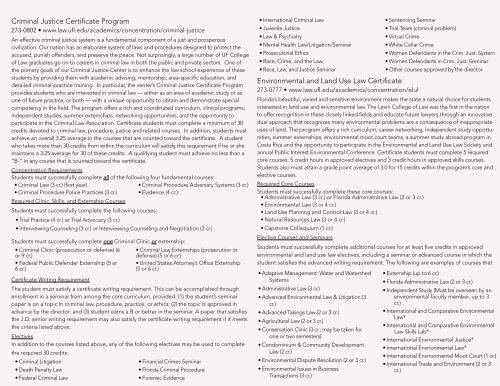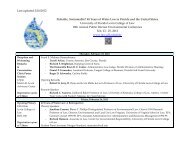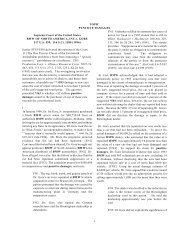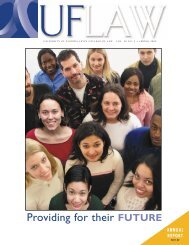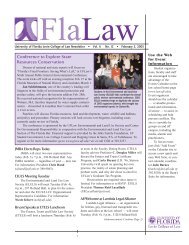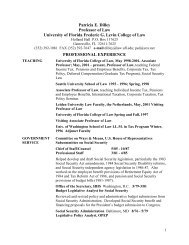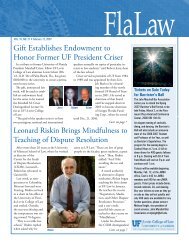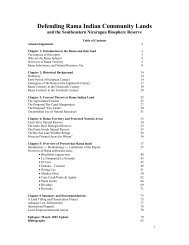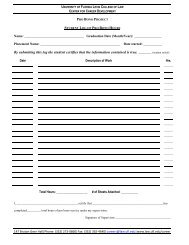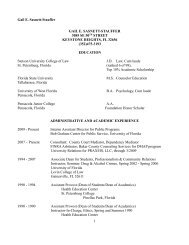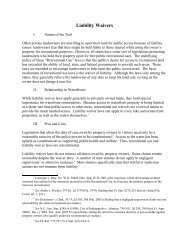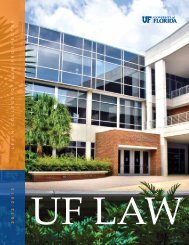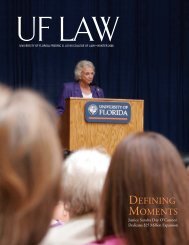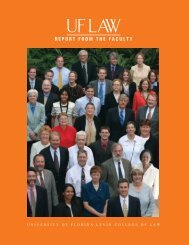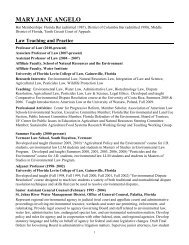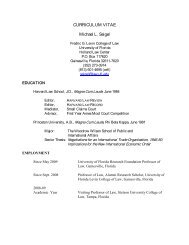2013-2014 Calendar & Guide to uF law - Levin College of Law ...
2013-2014 Calendar & Guide to uF law - Levin College of Law ...
2013-2014 Calendar & Guide to uF law - Levin College of Law ...
- No tags were found...
You also want an ePaper? Increase the reach of your titles
YUMPU automatically turns print PDFs into web optimized ePapers that Google loves.
Criminal Justice Certificate Program273-0802 • www.<strong>law</strong>.ufl.edu/academics/concentration/criminal-justiceAn effective criminal justice system is a fundamental component <strong>of</strong> a just and prosperouscivilization. Our nation has an elaborate system <strong>of</strong> <strong>law</strong>s and procedures designed <strong>to</strong> protect theaccused, punish <strong>of</strong>fenders, and preserve the peace. Not surprisingly, a large number <strong>of</strong> UF <strong>College</strong><strong>of</strong> <strong>Law</strong> graduates go on <strong>to</strong> careers in criminal <strong>law</strong> in both the public and private sec<strong>to</strong>rs. One <strong>of</strong>the primary goals <strong>of</strong> our Criminal Justice Center is <strong>to</strong> enhance the <strong>law</strong> school experience <strong>of</strong> thesestudents by providing them with academic advising, men<strong>to</strong>rship, area-specific education, anddetailed criminal-practice training. In particular, the center’s Criminal Justice Certificate Programprovides students who are interested in criminal <strong>law</strong> — either as an area <strong>of</strong> academic study or asone <strong>of</strong> future practice, or both — with a unique opportunity <strong>to</strong> obtain and demonstrate specialcompetency in the field. The program <strong>of</strong>fers a rich and coordinated curriculum, clinical programs,independent studies, summer externships, networking opportunities, and the opportunity <strong>to</strong>participate in the Criminal <strong>Law</strong> Association. Certificate students must complete a minimum <strong>of</strong> 30credits devoted <strong>to</strong> criminal <strong>law</strong>, procedure, justice and related courses. In addition, students mustachieve an overall 3.25 average in the courses that are counted <strong>to</strong>ward the certificate. A studentwho takes more than 30 credits from within the curriculum will satisfy this requirement if he or shemaintains a 3.25 average for 30 <strong>of</strong> these credits. A qualifying student must achieve no less than a“B-” in any course that is counted <strong>to</strong>ward the certificate.Concentration RequirementsStudents must successfully complete all <strong>of</strong> the following four fundamental courses:• Criminal <strong>Law</strong> (3 cr.) (first year)• Criminal Procedure Police Practices (3 cr.)Required Clinic, Skills, and Externship CoursesStudents must successfully complete the following courses:• Trial Practice (4 cr.) or Trial Advocacy (3 cr.)• Interviewing Counseling (3 cr.) or Interviewing Counseling and Negotiation (3 cr.)Students must successfully complete one Criminal Clinic or externship:• Criminal Clinic (prosecution or defense) (6or 9 cr.)• Federal Public Defender Externship (5 or6 cr.)• Criminal Procedure Adversary Systems (3 cr.)• Evidence (4 cr.)• Criminal <strong>Law</strong> Externships (prosecution ordefense) (5 or 6 cr.)• United States At<strong>to</strong>rney’s Office Externship(5 or 6 cr.)Certificate Writing RequirementThe student must satisfy a certificate writing requirement. This can be accomplished throughenrollment in a seminar from among the core curriculum, provided: (1) the student’s seminarpaper is on a <strong>to</strong>pic in criminal <strong>law</strong>, procedure, practice, or ethics; (2) the <strong>to</strong>pic is approved inadvance by the direc<strong>to</strong>r; and (3) student earns a B or better in the seminar. A paper that satisfiesthe J.D. senior writing requirement may also satisfy the certificate writing requirement if it meetsthe criteria listed above.ElectivesIn addition <strong>to</strong> the courses listed above, any <strong>of</strong> the following electives may be used <strong>to</strong> completethe required 30 credits:• Criminal Litigation• Financial Crimes Seminar• Death Penalty <strong>Law</strong>• Florida Criminal Procedure• Federal Criminal <strong>Law</strong>• Forensic Evidence• International Criminal <strong>Law</strong>• Juvenile Justice• <strong>Law</strong> & Psychiatry• Mental Health <strong>Law</strong>/Litigation/Seminar• Prosecu<strong>to</strong>rial Ethics• Race, Crime, and the <strong>Law</strong>• Race, <strong>Law</strong>, and Justice SeminarEnvironmental and Land Use <strong>Law</strong> Certificate273-0777 • www.<strong>law</strong>.ufl.edu/academics/concentration/elulFlorida’s beautiful, varied and sensitive environment makes the state a natural choice for studentsinterested in land use and environmental <strong>law</strong>. The <strong>Levin</strong> <strong>College</strong> <strong>of</strong> <strong>Law</strong> was the first in the nation<strong>to</strong> <strong>of</strong>fer recognition in these closely linked fields and educate future <strong>law</strong>yers through an innovativedual approach that recognizes many environmental problems are a consequence <strong>of</strong> inappropriateuses <strong>of</strong> land. The program <strong>of</strong>fers a rich curriculum, career networking, independent study opportunities,summer externships, environmental moot court teams, a summer study abroad program inCosta Rica and the opportunity <strong>to</strong> participate in the Environmental and Land Use <strong>Law</strong> Society andannual Public Interest Environmental Conference. Certificate students must complete 5 requiredcore courses, 5 credit hours in approved electives and 3 credit hours in approved skills courses.Students also must attain a grade point average <strong>of</strong> 3.0 for 15 credits within the program’s core andelective courses.Required Core CoursesStudents must successfully complete these core courses:• Administrative <strong>Law</strong> (3 cr.) or Florida Administrative <strong>Law</strong> (2 or 3 cr.)• Environmental <strong>Law</strong> (3 or 4 cr.)• Land Use Planning and Control <strong>Law</strong> (3 or 4 cr.)• Natural Resources <strong>Law</strong> (3 or 4 cr.)• Caps<strong>to</strong>ne Colloquium (1 cr.)Elective Courses and SeminarsStudents must successfully complete additional courses for at least five credits in approvedenvironmental and land use <strong>law</strong> electives, including a seminar or advanced course in which thestudent satisfies the advanced writing requirement. The following are examples <strong>of</strong> courses that• Adaptive Management: Water and WatershedSystems• Administrative <strong>Law</strong> (3 cr.)• Advanced Environmental <strong>Law</strong> & Litigation (3cr.)• Advanced Takings <strong>Law</strong> (2 or 3 cr.)• Agricultural <strong>Law</strong> (2 or 3 cr.)• Conservation Clinic (3 cr.; may be taken forone or two semesters)• Condominium & Community Development<strong>Law</strong> (2 cr.)• Environmental Dispute Resolution (2 or 3 cr.)• Environmental Issues in BusinessTransactions (3 cr.)• Sentencing Seminar• Trial Team (criminal problem)• Virtual Crime• White Collar Crime• Women Defendants in the Crim. Just. System• Women Defendants in Crim. Just. Seminar• Other courses approved by the direc<strong>to</strong>r• Externship (up <strong>to</strong> 6 cr.)• Florida Administrative <strong>Law</strong> (2 or 3 cr.)• Independent Study (Must be overseen by anenvironmental faculty member, up <strong>to</strong> 3cr.)• International and Comparative Environmental<strong>Law</strong>*• International and Comparative Environmental<strong>Law</strong> Skills Lab*• International Environmental Justice*• International Envrionmental <strong>Law</strong>*• International Environmental Moot Court (1 cr.)• International Trade and Environment (2 or 3cr.)


